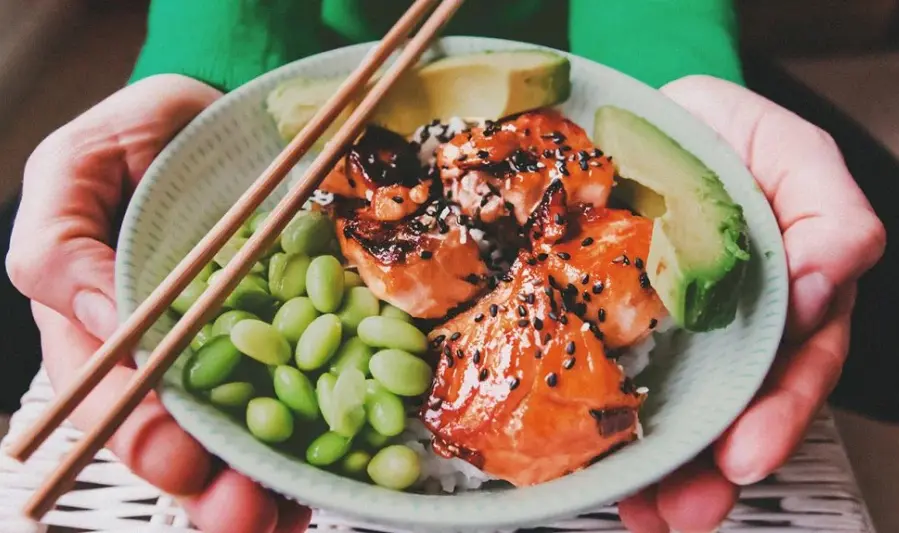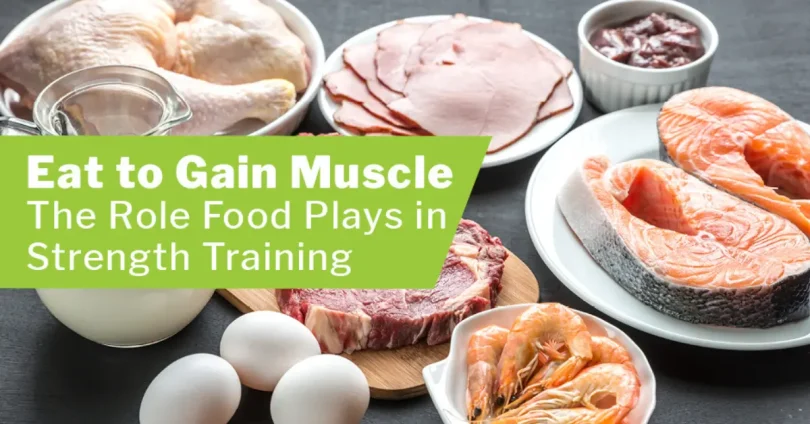Introduction
Building muscle isn’t just about lifting weights — your nutrition plays an equally important role. While strength training stimulates muscle fibers to grow and repair, the right diet provides the fuel and building blocks your body needs to support this process. Without proper nutrition, even the best workout routine can produce slow or limited results.
A balanced, protein-rich eating plan ensures that your body gets essential nutrients like proteins, carbohydrates, healthy fats, vitamins, and minerals. These nutrients help improve strength, support muscle recovery, boost energy during workouts, and promote overall health.
In this guide, you’ll learn why nutrition is essential for muscle growth, what foods to focus on, how to plan your meals, and practical tips to support your fitness goals. Whether you’re a beginner or already training, this information will help you build a strong nutritional foundation for better results.
Understanding Muscle Building Basics

How Muscles Grow (Training + Recovery + Nutrition)
Muscle growth happens through a three-step process:
- Training: Strength exercises create small tears in muscle fibers.
- Recovery: The body repairs these fibers, making them stronger and thicker.
- Nutrition: Protein, carbs, and healthy fats supply the energy and building blocks required for muscle repair and growth.
Together, these elements create the ideal environment for consistent muscle development.
Caloric Surplus and Its Impact on Muscle Gain
Building muscle requires slightly more calories than you burn, known as a caloric surplus.
A moderate surplus:
- Provides sufficient energy for intense workouts
- Supports muscle repair
- Prevents muscle breakdown
- Helps in gaining lean mass instead of fat
Why Surplus Should Be Controlled
A small surplus (around 200–300 calories above maintenance) is ideal to promote muscle growth without unnecessary fat gain.
Essential Nutrients for Muscle Growth

3.1 Protein
Protein is the most important nutrient for building and repairing muscle tissues.
Role in Muscle Repair
After strength training, muscles develop tiny tears. Protein helps rebuild these fibers, making them stronger and bigger.
Daily Protein Requirements
- Most people need 1.2–2.0 grams per kg of body weight for muscle gain.
- Beginners may start on the lower end, while active lifters need more.
Best Food Sources
- Chicken, fish, eggs
- Greek yogurt, cottage cheese
- Lentils, beans, tofu, chickpeas
- Whey or plant-based protein powders
3.2 Carbohydrates
Carbs provide the primary fuel your body needs for intense workouts.
Importance for Energy and Performance
- Carbohydrates replenish glycogen stores
- Improve training performance
- Reduce fatigue and support recovery
Types of Carbs: Complex vs. Simple
- Complex carbs: Slow-digesting, steady energy (oats, brown rice, quinoa)
- Simple carbs: Quick energy (fruits, honey, white rice)
Best Sources for Muscle Gain
- Oats, sweet potatoes, brown rice
- Fruits like bananas, apples, berries
- Whole-grain bread and pasta
3.3 Healthy Fats
Healthy fats support vital body functions needed for muscle growth.
Role in Hormones and Recovery
- Help produce hormones like testosterone that aid muscle building
- Support recovery and reduce inflammation
Sources of Good Fats
- Olive oil, avocado
- Almonds, walnuts, peanuts
- Chia seeds, flaxseeds
- Fatty fish (salmon, mackerel)
3.4 Micronutrients
Micronutrients ensure your muscles, bones, and nerves function properly.
Importance of Vitamins & Minerals
- Support energy production
- Improve muscle contraction
- Strengthen bones
- Enhance recovery
Key Micronutrients for Muscle Health
- Vitamin D: Bone strength and hormone support
- Magnesium: Muscle function and relaxation
- Calcium: Muscle contraction
- B Vitamins: Energy metabolism
- Iron: Oxygen delivery for better performance
Best Muscle-Building Foods
4.1 Animal-Based Options
Animal-based foods are rich in complete proteins, meaning they contain all essential amino acids needed for muscle growth.
Chicken
Lean source of protein that supports muscle repair and building.
Fish
Salmon, tuna, and mackerel provide protein plus omega-3 fatty acids that help reduce inflammation and support recovery.
Eggs
Contain high-quality protein and essential nutrients like vitamin D and B vitamins, which boost strength and energy.
Dairy
Milk, Greek yogurt, and cottage cheese offer protein, calcium, and beneficial probiotics that aid digestion and muscle recovery.
4.2 Plant-Based Options
Plant-based foods provide protein, fiber, and essential nutrients while supporting overall health.
Lentils
High in protein and fiber, perfect for muscle repair and long-lasting fullness.
Beans
Kidney beans, black beans, and chickpeas offer a balanced mix of protein, carbs, and minerals.
Tofu
A complete plant protein that supports muscle growth and works well in many dishes.
Nuts
Almonds, peanuts, and walnuts provide protein, healthy fats, and energy for workouts.
4.3 High-Protein Snacks
Quick high-protein snacks help increase daily protein intake and support muscle recovery between meals.
Quick Snack Ideas for Extra Protein
- Greek yogurt with fruit
- Protein shake or smoothie
- Hard-boiled eggs
- Peanut butter on whole-grain toast
- Roasted chickpeas
- Cottage cheese with nuts
- Protein bars (low sugar options)
Pre-Workout Nutrition
Timing (1–2 Hours Before Workout)
Eating the right foods 1–2 hours before your workout ensures you have enough energy, strength, and focus to perform well.
This meal should include:
- Carbohydrates for quick and sustained energy
- A small amount of protein for muscle support
- Minimal fats and fiber to avoid digestion issues during exercise
Why Timing Matters
A well-timed pre-workout meal:
- Boosts endurance
- Enhances workout intensity
- Prevents fatigue
- Improves overall performance
Best Foods for Energy and Endurance
Choosing the right foods helps fuel your muscles and maintain strength throughout the session.
Recommended Pre-Workout Foods
- Oatmeal with banana
- Whole-grain toast with peanut butter
- Greek yogurt with berries
- Brown rice with chicken (light portion)
- Fruit smoothie with milk or yogurt
- Banana or apple with a handful of nuts
Quick Snacks if You’re Short on Time (30 Minutes Before)
- Banana
- Dates
- A small protein bar
- A slice of toast with honey
These options provide fast-digesting carbs for quick energy.
Post-Workout Nutrition
Timing (30–60 Minutes After Workout)
The period right after your workout—known as the anabolic window—is the best time to refuel your body. Eating within 30–60 minutes helps:
- Speed up muscle recovery
- Rebuild muscle fibers
- Replenish lost glycogen
- Reduce soreness
Why Timing Matters
Your muscles absorb nutrients more efficiently during this time, making post-workout nutrition essential for faster strength and muscle gains.
Protein + Carbs Combination
A balanced combination of protein and carbohydrates is ideal after training.
Role of Protein
- Repairs damaged muscle fibers
- Supports muscle growth
- Helps reduce recovery time
Role of Carbohydrates
- Restores glycogen stores
- Replenishes energy
- Enhances nutrient delivery to muscles
A good post-workout meal typically includes:
- 20–30g protein
- 30–50g carbohydrates
Recovery-Enhancing Foods
Choose foods that support muscle repair, energy recovery, and hydration.
Recommended Post-Workout Foods
- Grilled chicken with brown rice
- Eggs with whole-grain toast
- Tuna sandwich
- Greek yogurt with fruit
- Cottage cheese with honey
- Protein smoothie with banana
- Lentils with quinoa
Hydration Options
- Water
- Coconut water
- Low-fat milk
These help replace fluids and electrolytes lost during training.
you ma also like to read these posts:
Discover the Beauty of Indonesian Traditional Fashion Styles
Learn Java Easily Online with Simple Coding Examples
Easy Core Java Tutorials for Beginners to Start Coding
Beginner-Friendly Home Workouts: Simple Routines to Get Started
Hydration for Muscle Building
Daily Water Needs
Staying hydrated is essential for muscle growth, performance, and recovery. Water supports nutrient transport, digestion, joint lubrication, and temperature regulation during workouts.
How Much Water You Need
- General recommendation: 2.5–3.5 liters per day
- Active individuals may need more depending on sweat and workout intensity
- Drink consistently throughout the day rather than all at once
Signs of Dehydration
Even mild dehydration can reduce strength, lower endurance, and slow recovery.
Common Warning Signs
- Dry mouth or cracked lips
- Dark yellow urine
- Fatigue or dizziness
- Muscle cramps
- Headaches
- Reduced workout performance
If you notice these symptoms, increase water intake immediately.
Electrolytes and Workout Hydration
Electrolytes (sodium, potassium, magnesium) help maintain fluid balance, muscle function, and nerve signaling.
When You Need Electrolytes
- Intense workouts lasting over 60 minutes
- Outdoor training in heat
- Heavy sweating
- Long endurance sessions
Good Electrolyte Sources
- Coconut water
- Bananas and oranges
- Sports drinks (low sugar)
- Oral rehydration solutions
- Salted nuts or seeds
- Magnesium- and potassium-rich foods
Proper hydration improves muscle pumps, strength output, and overall recovery.
Sample Muscle-Building Meal Plan
Complete Full-Day Meal Example
This sample plan provides balanced protein, carbohydrates, and healthy fats to support muscle repair, energy, and steady muscle growth.
Breakfast
- Oatmeal cooked in milk
- Two boiled eggs
- Banana or berries
Mid-Morning Snack
- Greek yogurt
- A handful of almonds
Lunch
- Grilled chicken breast or tofu
- Brown rice or quinoa
- Steamed vegetables such as broccoli, carrots, and beans
- Glass of water or buttermilk
Pre-Workout Snack
- Peanut butter on whole-grain toast
- One banana
Post-Workout Meal
- Protein shake with banana
- Handful of dates or one slice of whole-grain bread
Dinner
- Fish or lentils
- Sweet potato or whole-wheat roti
- Mixed salad made with spinach, cucumber, and tomatoes
Before Bed (Optional)
- Cottage cheese or a glass of milk
- A few nuts
Balanced Macros Throughout the Day
A muscle-building diet should maintain a healthy balance of macronutrients to enhance performance, support recovery, and encourage lean muscle growth.
Ideal Daily Macro Breakdown
- Protein: 25–35 percent of total calories
- Carbohydrates: 40–50 percent of total calories
- Healthy fats: 20–30 percent of total calories
Why Balanced Macros Matter
- Provides steady energy for training
- Prevents muscle breakdown
- Supports faster recovery and strength development
Faqs:
How much protein do I need per day to build muscle?
Most people need 1.2–2.0 grams of protein per kilogram of body weight daily for effective muscle growth. The exact amount depends on training intensity and goals.
Can I build muscle without supplements?
Yes, absolutely. A well-balanced diet with enough protein, carbs, and healthy fats can support muscle growth. Supplements like whey or creatine are optional, not mandatory.
What should I eat before a workout?
Eat a meal rich in complex carbs and moderate protein 1–2 hours before training. Good options include oatmeal, bananas, chicken with rice, or yogurt with fruit.
How soon should I eat after a workout?
Aim to eat within 30–60 minutes after your workout. A combination of protein and carbohydrates helps repair muscles and restore energy levels.
Is eating more calories necessary for muscle building?
Yes. For muscle growth, you usually need a caloric surplus, meaning you eat slightly more calories than your body burns. Focus on nutritious, high-quality foods.
Conclusion
Building muscle isn’t just about lifting weights—it’s about fueling your body with the right nutrition every single day. A balanced intake of protein, carbohydrates, healthy fats, and essential micronutrients helps support muscle repair, energy, and overall performance. By eating purposefully before and after workouts, staying hydrated, and avoiding common mistakes, you can accelerate your progress and achieve sustainable results. Remember, consistency is key. With a solid nutrition plan and smart food choices, anyone can build muscle effectively and confidently.




